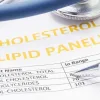How do Hormonal Changes Affect Cholesterol in Women?
Hormonal changes can have a significant impact on various aspects of a woman’s health, including cholesterol levels. As women go through different stages of life, such as puberty, menstruation, pregnancy, and menopause, their hormone levels fluctuate, leading to changes in cholesterol metabolism. In this article, we will explore how hormonal changes affect cholesterol in women and provide insights into maintaining a healthy balance.
1. Puberty and Menstruation
During puberty, hormonal changes in girls trigger the development of secondary sexual characteristics and the onset of menstruation. These changes can influence cholesterol levels in several ways:
- Estrogen and HDL Cholesterol: Estrogen, one of the primary female sex hormones, plays a vital role in raising high-density lipoprotein (HDL) cholesterol levels. HDL cholesterol is often referred to as “good” cholesterol because it helps remove low-density lipoprotein (LDL) cholesterol, the “bad” cholesterol, from the bloodstream.
- Progesterone and Triglycerides: Progesterone, another female sex hormone, can contribute to increased levels of triglycerides, a type of fat found in the blood. Higher triglyceride levels are associated with an increased risk of heart disease.
- Menstrual Cycle Effects: Hormonal fluctuations throughout the menstrual cycle can affect cholesterol levels. During the follicular phase, when estrogen levels rise, HDL cholesterol tends to increase. In contrast, during the luteal phase, when progesterone levels rise, LDL cholesterol and triglyceride levels may be elevated.
2. Pregnancy
Pregnancy is a period of profound hormonal changes that have a significant impact on cholesterol metabolism. These changes are essential for supporting the growth and development of the fetus. Here’s how hormonal shifts during pregnancy can influence cholesterol levels:
- Estrogen and Cholesterol Transport: Estrogen levels rise significantly during pregnancy. This hormone plays a crucial role in enhancing the production of cholesterol transport proteins, such as lipoprotein receptors. These receptors help regulate cholesterol levels in the blood.
- Cholesterol Synthesis: The body’s cholesterol synthesis increases during pregnancy to meet the demands of the growing fetus. This increase is facilitated by hormonal changes and the activation of certain enzymes involved in cholesterol production.
- Postpartum Cholesterol Levels: After giving birth, cholesterol levels typically return to pre-pregnancy levels. However, certain factors, such as breastfeeding and changes in lifestyle, can influence postpartum cholesterol metabolism.
3. Menopause
Menopause is a natural phase in a woman’s life when her menstrual cycle stops, and hormone production declines. These changes can significantly impact cholesterol levels and cardiovascular health. Here’s how hormonal changes during menopause affect cholesterol:
- Estrogen Withdrawal: As women reach menopause, estrogen levels decline significantly. Estrogen helps maintain healthy cholesterol levels by increasing HDL cholesterol and reducing LDL cholesterol. With estrogen withdrawal, there is a shift towards higher LDL cholesterol and lower HDL cholesterol, which increases the risk of cardiovascular disease.
- Increased LDL Particle Number: Menopause is also associated with an increase in LDL particle number, which further contributes to the development of atherosclerosis and heart disease.
Maintaining Healthy Cholesterol Levels
While hormonal changes can affect cholesterol levels in women, there are several lifestyle interventions that can help maintain a healthy balance:
- Balanced Diet: Adopting a healthy diet rich in fruits, vegetables, whole grains, and lean proteins can help control cholesterol levels. Limiting saturated and trans fats, as well as processed foods and sugary beverages, is crucial.
- Regular Physical Activity: Engaging in regular physical activity, such as aerobic exercises, can help raise HDL cholesterol levels and lower LDL cholesterol levels.
- Maintaining a Healthy Weight: Excess weight, especially around the waist, is associated with higher LDL cholesterol and triglyceride levels. Maintaining a healthy weight through proper diet and exercise can help manage cholesterol levels.
- Smoking Cessation: Smoking can lead to lower levels of HDL cholesterol and damage the lining of blood vessels, increasing the risk of heart disease. Quitting smoking is vital for maintaining healthy cholesterol levels.
In conclusion, hormonal changes in women can significantly impact cholesterol levels throughout various stages of life. Understanding these changes and adopting a healthy lifestyle can help maintain optimal cholesterol levels and reduce the risk of cardiovascular disease.
Experience the Joy of Achieving Your Health and Fitness Goals with Fitpaa App
The journey to achieving health and fitness goals can often be challenging, but with the right support and guidance, it becomes much easier. Fitpaa, India’s top-ranked mHealth app, is here to assist you every step of the way.
How Fitpaa Helps You Achieve Your Health and Fitness Goals:
- Metabolism Assessment: Fitpaa’s advanced Metabolism Monitoring Technology identifies the root cause of your health condition by assessing your current metabolism. Optimizing your metabolism is crucial for achieving your health and fitness goals.
- Personalized Fitpaa Capsule: Based on your metabolism, health goals, lifestyle, and eating habits, Fitpaa’s expert team of fitness coaches, nutritionists, and doctors prepare your Personalized Fitpaa Capsule. This comprehensive plan combines medical therapy, medical exercise therapy, medical nutrition therapy, and cognitive behavior therapy to optimize your metabolism and ensure guaranteed results.
- Real-time Guidance and Monitoring: Fitpaa’s innovative Realtime Guidance technology incorporates habit-building techniques, timely reminders, and purpose-finding principles from cognitive behavioral therapy. This technology keeps you motivated and inspired throughout the day, guiding you to take the necessary actions to achieve your desired results.
- Fitpaa Mobile App: The Fitpaa mobile app provides all the necessary tools to follow your Fitpaa Capsule effortlessly. It features a virtual workout trainer, diet tracker, performance tracker, progress tracker, and much more.
- Expert Support: Fitpaa’s team of fitness planners, nutritionists, fitness trainers, and doctors regularly review your progress and make any necessary adjustments to ensure you stay on track towards your goal. You’ll receive unlimited consultations, daily follow-ups, and weekly reviews to keep you motivated and accountable.
Don’t miss out on the opportunity to experience the joy of being fit and excelling in life. Download the Fitpaa app now and take the first step towards achieving your health and fitness goals. Your wellbeing is our mission!
Request a trial today, and let Fitpaa help you transform your life.









